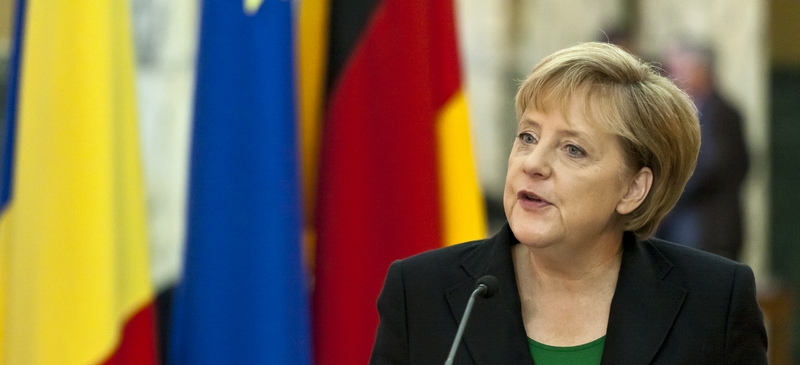
Believe it or not, Angela Merkel has a plan to tackle the euro crisis
While Merkel's vision for a fiscal union may not be the answer to all the eurozone's problems it could be a vital part of any solution.
A new "fiscal union" to underpin the euro is the main topic that Angela Merkel and Nicolas Sarkozy will discuss at their Paris meeting. Merkel insists on amending the EU treaties to make sure that euro countries live within their means in the future. The process of treaty change will be long and arduous and, if past experience is anything to go by, may succeed only at a second or third attempt.
So are Merkel's fiscal union plans beside the point at a time when debt and interbank markets are close to meltdown? Not quite: they are a political necessity to give Merkel more room for manoeuvre at home and to allow the European Central Bank to step up its role in stabilising the eurozone.
The fiscal union Merkel outlined in her speech to the German parliament on Friday is really the "stability union" so beloved by most Germans. At the heart of the construct will be tougher rules to enforce the euro's original deficit and debt limits. Euro member states that do not follow EU instructions for budget cuts will find themselves in front of the European court of justice. Those already in trouble – in particular those who have asked for bailout money – will lose a great deal of fiscal sovereignty.
Merkel's fiscal union is one-sided and legalistic, and a long way from Sarkozy's idea of euro-area leaders coming together to thrash out a common fiscal stance. Merkel reassured her parliamentarians that the EU would not gain more powers to intervene in the tax and spend decisions of countries which have their house in order – new sanctions and intervention powers would only affect those that borrow beyond agreed limits.
In the same vein Germany recently obtained written assurances from its euro partners that procedures to prevent pernicious imbalances between the euro countries would only apply for countries with external deficits, not those with surpluses, like Germany. A German-style fiscal union might thus impose a deflationary bias on eurozone policymaking in the long run. But what does it do to fight the current crisis?
The fact that Merkel now talks about new treaties and institutions makes her look more in charge. Until a few months ago the German debate about the euro crisis was focused on blame and bail-out mechanisms. Most Germans were spooked by the impression that their government was simply reacting to the latest market panic. Since the summer, however, German politicians have been queueing up to make big European speeches. Although Merkel is only talking about limited treaty change, at least she looks as if she has a plan. Almost two thirds of Germans now approve of her handling of the euro crisis, up from only 45% in October.
The talk about fiscal union will make it easier for Merkel to overcome objections to further rescue measures from suspicious voters, rebels within her own CDU party and a restive coalition partner. In her euro speech on Friday, Merkel said "fiscal union means both crisis management and new fiscal rules". Progress on the latter will hopefully give her room for manoeuvre on the former: more money and leverage for the European Financial Stability Facility, a way of getting the IMF more involved, and at least a long-term road map towards eurobonds or some other means of mutually guaranteeing eurozone debt.
Merkel's fiscal union plans may also give the ECB a freer hand to ramp up its bond-buying programme, and thus give troubled euro countries breathing space. Commentators have often called on Merkel to tell the ECB to "buy more bonds". This was never going to happen. Germany is the nation that thinks it invented central bank independence, and most Germans are against the ECB buying Greek or Italian bonds. But politicians and officials in Berlin also acknowledge that ECB action is a necessary if unsavoury part of any euro rescue plan.
One person close to Merkel told me he wished the ECB would be less hesitant in its bond-buying programme, while another said it was "sad" that the Bundesbank was quite so dogmatic. But German politicians are cautious not to criticise central bankers in public. On the contrary, they think that if they told the ECB to buy more bonds it would probably do the opposite, to make a point about its independence. Merkel said as much during her speech on Friday.
The ECB's president, Mario Draghi, has indicated that the bank may consider new measures if eurozone leaders tie a credible package of bailout measures and fiscal constraints. The bank does not want to be the lender of first resort, and it does not want to be responsible for imposing austerity programmes on countries that benefit from ECB bond-buying or euro bailouts. That ball should be in the politicians' court. Therefore, while Merkel's vision for a fiscal union is not the tool to stem the crisis, it might turn out to be a necessary ingredient of a bigger package to save the euro.
